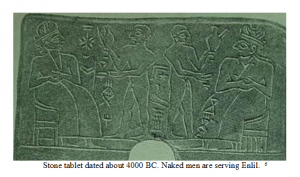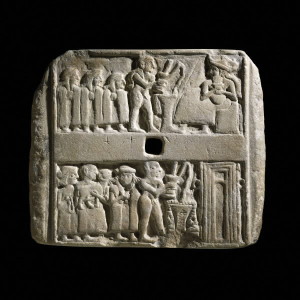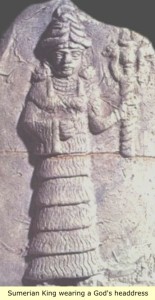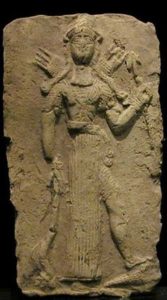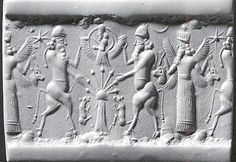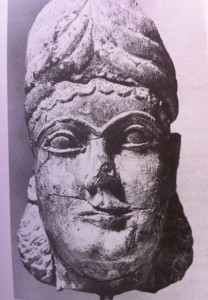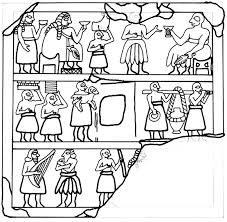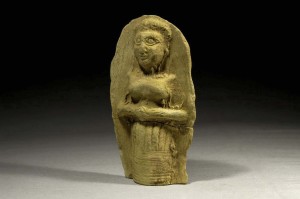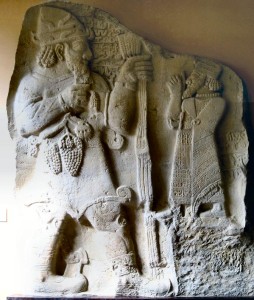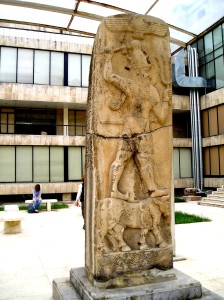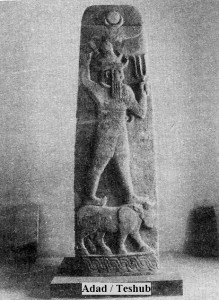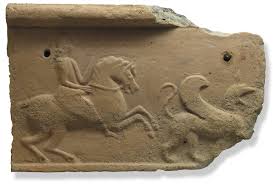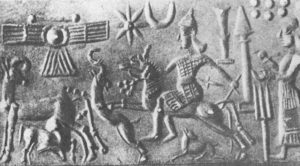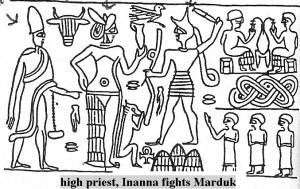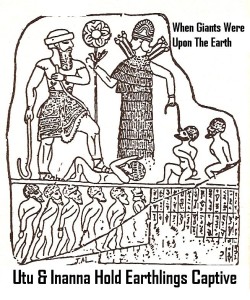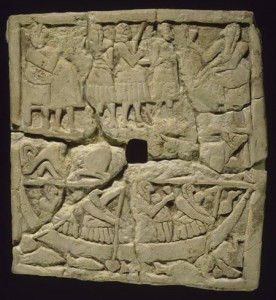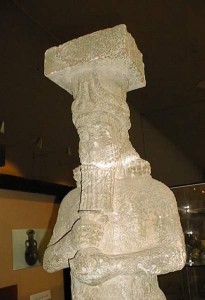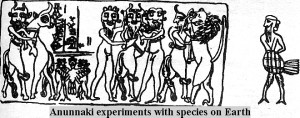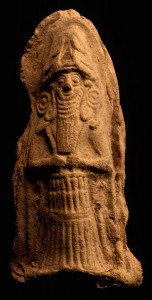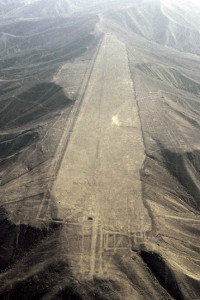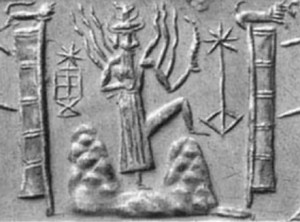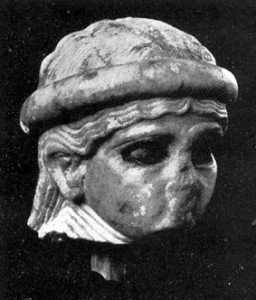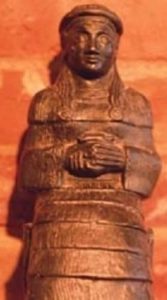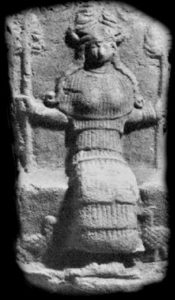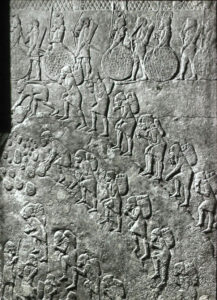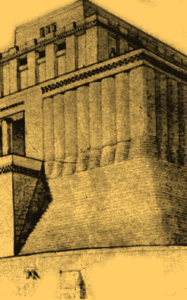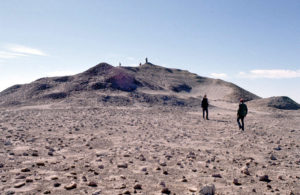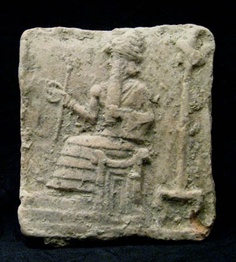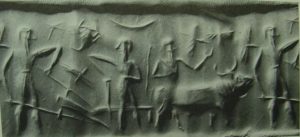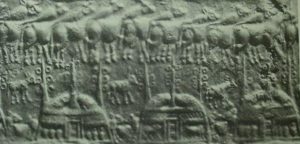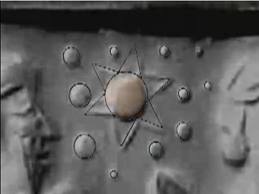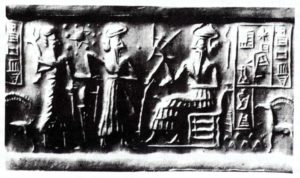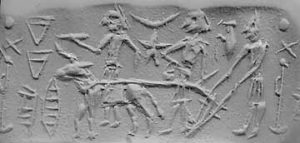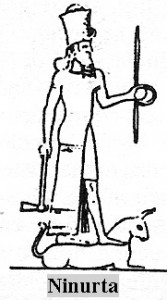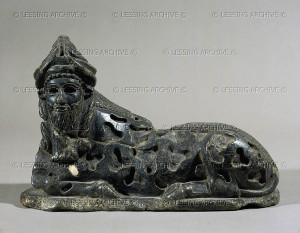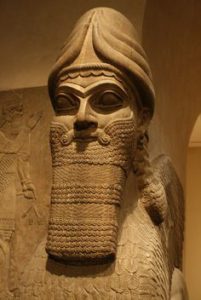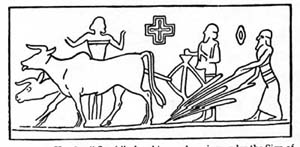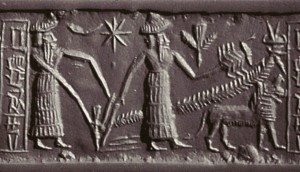The Electronic Text Corpus of Sumerian Literature
(Texts: All Artifacts, Color Coding, & Writings in Bold Type With Italics Inside Parenthesis, are Added by Editor R. Brown, not the Authors, Translators, or Publishers!)
(gods in blue …mixed-breed demigods in teal…)
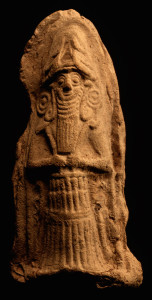 (An / Anu, King of entire planet Nibiru & Earth Colony, A ONE WORLD ORDER)
(An / Anu, King of entire planet Nibiru & Earth Colony, A ONE WORLD ORDER)
1-11 An (Anu) lifted his head in pride and brought forth a good day.
He laid plans for …… and spread the population wide.
Enlil set his foot upon the earth like a great bull.
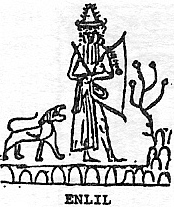
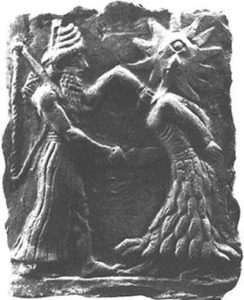 (Enlil, King Anu‘s son & heir, Earth Colony Commander “who came down”)
(Enlil, King Anu‘s son & heir, Earth Colony Commander “who came down”)
Enlil, the king of all lands, set his mind to increasing the good day of abundance (on Earth),
to making the …… night resplendent in celebration, to making flax grow, to making barley proliferate,
to guaranteeing the spring floods at the quay, to making …… lengthen (?) their days in abundance,
to making Summer close the sluices of heaven, and to making Winter guarantee plentiful water at the quay.
12-18 He copulated with the great hills, he gave the mountain its share.
He filled its womb with Summer and Winter, the plenitude and life of the Land.
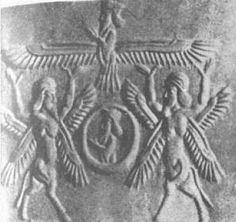 (Anu & Enlil in their sky-discs, scanning the lands on Earth)
(Anu & Enlil in their sky-discs, scanning the lands on Earth)
As Enlil copulated with the earth, there was a roar like a bull’s.
The hill spent the day at that place and at night she opened her loins.
She bore Summer and Winter as smoothly as fine oil.
He fed them pure plants (from Nibiru) on the terraces of the hills like great bulls.
He nourished them in the pastures of the hills.
19-25 Enlil set about determining the destinies of Summer and Winter.
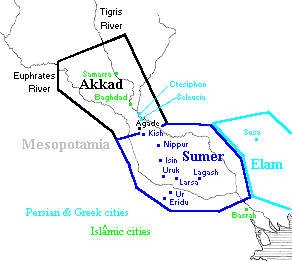 (1st settlements established by Enlil in Sumer)
(1st settlements established by Enlil in Sumer)
For Summer founding towns and villages (establishing Sumer),
bringing in harvests of plenitude for the Great Mountain Enlil,
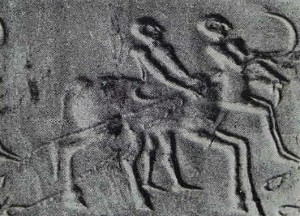
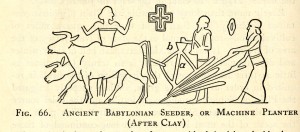
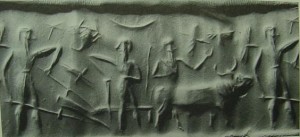
(in the beginning the aliens did the farming, then they fashioned “modern man” into their image, & into their likeness, to become replacement workers for the Anunnaki giants, who put the burdensome hard labor upon the earthlings for all time)
sending laborers out to the large arable tracts, and working the fields with oxen;
for Winter plenitude, the spring floods, the abundance and life of the Land,
placing grain in the fields and fruitful acres, and gathering in everything —
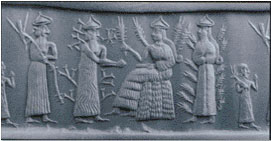
(Enlil with plow, Haia – Barley god, Nisaba & daughter Ninlil – Goddesses of Grains, & unidentified)
Enlil determined these as the destinies of Summer and Winter.
26-32 By hand Winter guided the spring floods,
the abundance and life of the Land, down from the edge of the hills.
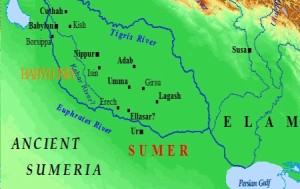 (Earth Colony’s 1st cities, established by the giant alien Anunnaki gods)
(Earth Colony’s 1st cities, established by the giant alien Anunnaki gods)
He set his foot upon the Tigris and Euphrates like a big bull and released them
into the fields and fruitful acres (the “land between the rivers”, the “Eden”, establishment) of Enlil.
He shaped lagoons in the water of the sea.
He let fish and birds together come into existence by the sea.
He surrounded all the reed-beds with mature reeds, reed shoots and …… reeds.
33-44 Summer, the heroic son of Enlil, drained the large arable tracts.
He …… cool water on the fields and fruitful acres like ……
2 lines unclear
5 lines fragmentary
approx. 1 line missing
1 line fragmentary
45-49 Holy Winter …….
The ox …… its head in the yoke.
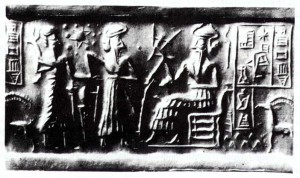
(mixed-breed worker, Ninurta, & Enlil hands the burdensome labor of farming to the earthling workers)
Ninurta, Enlil‘s son, …… the fruitful acres.
He …… grain in the large arable tracts.
He fills the fields and fruitful acres of Enlil.
50-60 Winter made the ewe give birth to the lamb, he gave the kid to the goat.
He made cows teem together with their calves, he provided butter and milk.
On the high plain he made the deer and stag glad of heart.
He made the birds of heaven set their nests in the broad spaces.
The fish of the lagoons laid eggs in the reed-bed.
In all the orchards he made honey and wine drip (?) to the ground.
He made the trees, wherever planted, bear fruit.
He established gardens and provided plants.
He made grain abundant in the furrows.
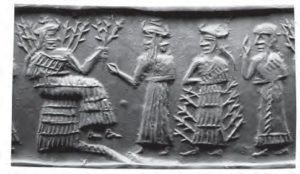 (Nisaba, Enlil, his spouse Ninlil, & semi-divine king)
(Nisaba, Enlil, his spouse Ninlil, & semi-divine king)
He made Ezina (Ninlil) appear radiant as a beautiful maiden.
The harvest, the great festival of Enlil, rose heavenward.
61-68 Summer founded houses and farmsteads, he made the cattle-pens and sheepfolds wide.
He multiplied the stacks of sheaves in all the arable tracts.
At their edges he made …… flax …… ripen (?).
He brought a plentiful harvest into the temples, he heaped up piles of grain.
He founded towns and villages, he built the houses of the Land.
He made the houses of the gods grow like the hills in a pure place.
In E-namtila, the holy seat of kingship, fit for high daises,
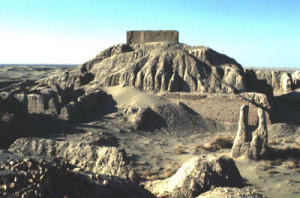 (Enlil‘s mud-brick-built mountain / residence in Nippur, Command Central)
(Enlil‘s mud-brick-built mountain / residence in Nippur, Command Central)
he established abundance for the Great Mountain Enlil.
69-88 Summer, the heroic son of Enlil, decided to bring offerings to E-namtila, the house of Enlil.
He brought animals, cattle and sheep of the hill, fully grown wild rams, deer and stags,
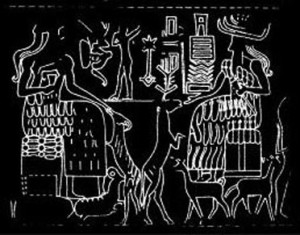
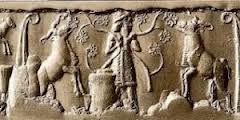
(giant alien gods Inanna & Dumuzi “The Shepherd” with his sheep; Dumuzi “The Shepherd” his stags)
…… sheep, long-fleeced barley-fed sheep, thick-tailed sheep.
Pigs grown fat in the midst of the reed-beds, porcupine, tortoise, turtle,
birds brooding in their nests, taken together with their eggs, harvest crops,
flour and malt for mixing, butter and milk from cattle-pen and sheepfold, wheat,
…… beans, small beans and large beans gathered in piled-high baskets,
onions …… in their furrows, zahadin onions and shallots, seed turnips, saffron (?), ……,
8 lines missing
— Summer, the heroic son of Enlil, offered.
89-104 Winter, lordly son of Enlil, ……, released the water of life and …… opened.
He gathered the …… oxen and …… the oxen.
The disputed sheep was provided, barley-fed but with a scorpion at its side.
Quartz, gold and silver found in leather pouches, cedar, cypress, ……, boxwood, ……,
…… tribute of the Land, figs from Mari, ……, strings of dried fruit, cool water,
the tribute of the hills, …… thick honey, dida beer, ……, village ……,
bibra birds, esig birds, buru-bacur birds, fattened ducks, carp, …… which Winter made grow up,
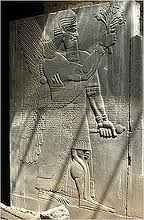
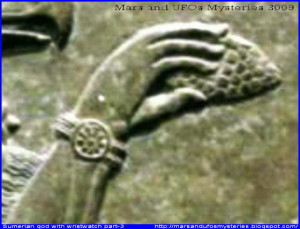 (giant Ninurta with discovered poppy, etc. on Earth)
(giant Ninurta with discovered poppy, etc. on Earth)
large pomegranates gathered from the orchards, big bunches of grapes on high,
winter cucumbers, …… empty ……, brought forth …… in the early rain,
large turnips, large …… cut down with the knife (?), long leeks —
Winter himself brought the tribute he had collected.
105-111 Summer and Winter set about organizing the animals and offerings for E-namtila, the house of Enlil.
The two of them, like huge butting bulls, reared themselves triumphantly.
But Winter, because his limbs had grown tired from the grain grown heavy in the furrows,
and the wheat and the emmer which he had been watering by hand,
turned away as from an enemy and would not draw near.
112-120 Consequently Winter was overcome by anger and he started a quarrel with Summer:
“Summer, my brother, you should not praise yourself; whatever harvest produce you bring as gifts
to the palace has not been made by your toil: you should not brag.
As if you were the one who had done the hard work, as if you had done the farming,
as if you had taken care of irrigation control during the spring floods,
as if you had brought forth the …… grain in the arable tracts with the dew from heaven —
how much through my toil is it that you enter the palace!
121-143 “Whatever animals, cattle and sheep of the hill, you bring to my …….
11 lines missing
3 lines fragmentary
Your gardener …… the palace …….
Honey and wine in the orchard …….
Its destructive hoe …….
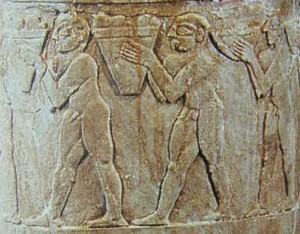 (early fashioned earthlings gathering produce for the gods in the “Eden”)
(early fashioned earthlings gathering produce for the gods in the “Eden”)
Your gathered vegetables, the purslane, …….
Whatever you …… at the gate of the palace.
In the field your arm …….
The straw of the grain you bring …….
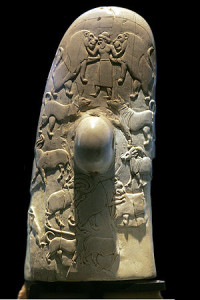 (Anunnaki giant alien god Nannar with his million cows in pens at Ur)
(Anunnaki giant alien god Nannar with his million cows in pens at Ur)
144-152 “After you have threshed it at your threshing floor, and have …… the cattle’s dung,
your carrying-nets are to hand, …… bearing your straw.
…… the animals, the storehouses and their contents.
After your houses and farmsteads …… sheep, …… from your cattle,
after …… their reed-beds, after …… green briars and cut …… thorns, …… storehouse
…… the dung of unyoked oxen — the slave Summer,
the duly-appointed laborer who will never rest from his toil,
a hired man who has to return to the fields of the Land for his own sustenance!”
153-156 On that day Winter taunted Summer.
Summer, the hero whom one does not challenge, searched for rude insults.
He was confident in himself, considering the harvest time, and turned aside.
Like a great bull eating rich grass, he raised his head.
157-163 Next, Summer replied to Winter:
“Winter, you may have to stay by the side of the oven, ……;
but you should not launch such serious insults against someone who does not lead a sedentary (?) life.
…… for the work of tilling the Land, with its difficulties,
you do not raise a cry in the gune (?) cult center, you do not look after the house.
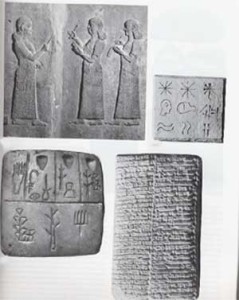 (alien Anunnaki Goddess of Scribes Nisaba, Geshtinanna, & unidentified)
(alien Anunnaki Goddess of Scribes Nisaba, Geshtinanna, & unidentified)
The young scribe is neglectful, which is an abomination, and no rushes are plucked for the beds.
The singer does not embellish the banquet, …… at its side.
164-171 “Winter, don’t launch such insults! …… to the desert.
I will make the strength of my power come forth in the house so that you recognize it.
In my working term of duty, which is seven months of the year, …… does not speak softly.
2 lines missing
1 line fragmentary
Tirelessly and constantly I place abundance upon the fields.
172-184 “After they …… my seed,
Winter, do not …… noise, when water is cut off from the arable tracts,
when the bowls lie placed, when the fishing place has been prepared,
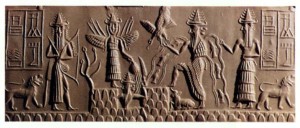
(Anunnaki alien gods Enlil, Inanna & Utu, Enki separated the edible fish, & two-faced god Isumud)
when the fish have been piled up, I am father Enlil‘s great comptroller.
I harrow the fields into fruitful acres.
When the oxen have stopped working the fields,
when you have concentrated your efforts on the damp areas and given the sign for the field work,
I do not work for you in the large arable tracts and fruitful acres early in the season.
If the spring grain bends its neck in the hollow of the furrows, no one provides a fence.
Whatever your farmer brings to the oxen, he will not make the oxen angry with me.
Winter …… in the uplands …….
The man of the bedroom …….”
185-188 Then Summer taunted Winter:
“Wise ……, serious insults ……, not …….”
189-199 Thereupon Winter replied to Summer:
“Summer, the donkey grazing on grass at the harvest ground and braying noisily,
the mule ……, the harvest ox chafing its neck in the pegs and tossing its head in the lead rope,
the innkeeper going to the harvest ground carrying a bowl in his hands,
the flour …… playing ……, the bragging fieldworker who does not know the extent of the field —
Summer, my brother, after you have gone out boasting about my toil,
when at the turn of the year grain is brought into the houses
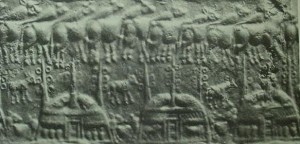
(all established by alien Anunnaki giants prior to “modern man”)
and the granaries are packed full, when you bring the surplus,
your bardul garment and your niglam garment are …….
When some one gives a two mana axe to you, you go off to your steppe.
200-215 “Summer, my brother, the wet spots must not be …… when tilling the field.
A man from the storehouse stands in front of you and instructs you.
When on the high plain …… the ash tree ……, …… yourself ……
1 line missing
When tribute is brought in your freight boats …….
When the grass has arrived in the storehouse, …… before me.
What will the penned sheep eat?
Your …… reeds are exhausted.
The reed-cutter who sets about pruning with the machete and splitting older reeds,
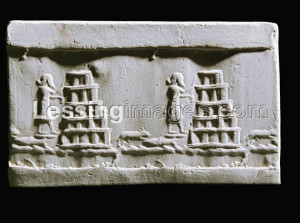
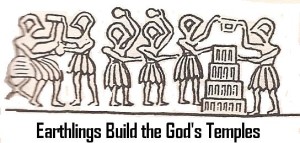
(Anunnaki giant aliens originally built their homes / ziggurats, then “modern man” took on the repairs & all new constructions)
the builder who places laborers in houses, never resting from his efforts,
the potter who digs out clay, lights a fire and stokes it with wood …… the pot!
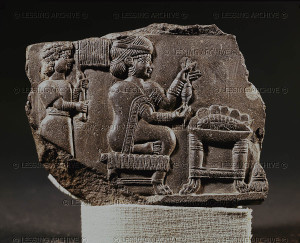
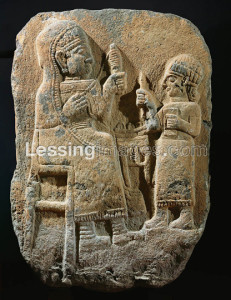
(Enki‘s daughter Uttu weaving & spinning thread, giant alien Goddess of Weaving)
Weaver, weave your bardul garment with the strength (?) of your aktum cloth.
Brewer, bake your beer bread at the harvest ground as your assignment!
Cook, produce great banquet loaves in summer!
The building supervisor …… the …… of the roofs.
People …… boots and shoes ……. (all 1st in Sumer / “Eden”)
216-224 “Summer, my brother, as long as you go with my term of duty,
great and small order you about and your string is not cut.
Although you have gathered all things in the Land and filled the storehouses,
in all my strength I am their owner when your limbs become tired.
When the clouds have brought down the abundance of heaven,
and the water of the first greening has descended from the hills,
and the new grain has been put in the granary to be added to the old grain,
the good farmer, having seen to his fields, shouts for joy,
the carrier donkeys stand ready and he sets out confidently for the city.
225-235 “My brother, when you have put the holy plow away in the barn,
the storehouse, everything you have gathered, you make a roar like fire.
You sit down to plentiful food and drink.
You obtain the choicest goods from the Land.
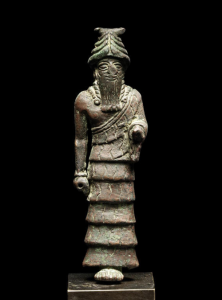
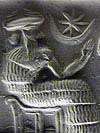
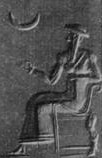
(Enlil‘s 2nd son Nannar, patron god of Ur, with the Moon Crescent Symbol of Nannar, found today used by Islam)
For my king named by Nanna (Nannar), the son of Enlil,
Ibbi-Suen (mixed-breed King of Ur), when he is arrayed in the cutur garment and the hursaj garment,
when you have taken care of the bardul garment and the nijlam garment,
when you have made a perfect feast for the gods,
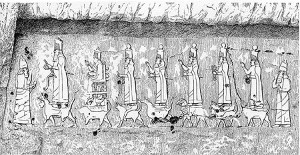 (Anunnaki alien giants upon animal symbols & zodiac signs)
(Anunnaki alien giants upon animal symbols & zodiac signs)
when the Anuna (alien Anunnaki) have placed garments on their holy bodies,
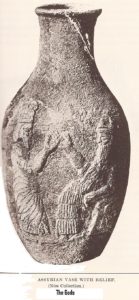 (Enlil & Anunnaki King father Anu, wearing the crown of planet Nibiru & colonies)
(Enlil & Anunnaki King father Anu, wearing the crown of planet Nibiru & colonies)
in his E-namtila, the holy abode of kingship founded by An (Anu),
at that place of content they prepare a choice banquet.
236-247 “When the cem and ala drums, …… and other instruments play together for him,

he passes the time with your heart-gladdening tigi and zamzam instruments.
But it is I who have made the wine plentiful and made much to eat and drink.
I perfect the garments with fine oil.
I bring up the ……, the cutur and aktum garments.
As for safeguarding, the best in Sumer, in the oppressive heat (?) of Summer,
where they had been put away in the bedrooms amongst the black-headed people (earthlings),
moths destroy the blankets and make the aktum cloth perish because of you.
…… exhausts itself for you …….
The wooden chest …….
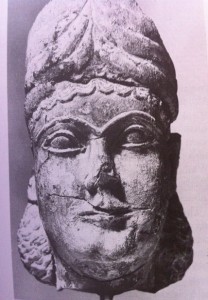
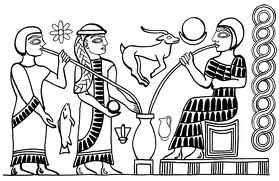
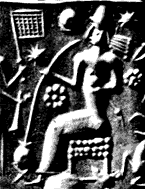
(Ninkasi, Enki‘s daughter, Goddess of Beer in Sumer, the “Eden”)
I am Ninkasi‘s help, for her I sweeten the beer,
with as much cold water, the tribute of the hills, as you brought.
248-258 “After …… pots, after …… pots, after the plump grapes have been laid out in the cool breeze,
I make my king’s great palace …… pleasant.
I am the one who cools down my king.
I fill the fish-hook.
My comrade, grasp your leather bag, go out …….
The farmer …… hardship.
The farmer …… the rain.
The gardener does not know how to plant purslane, your …… basket …….
How can you compare yourself to me while seeking a roof under which to rest?”
259-263 For a second time Winter had taunted Summer.
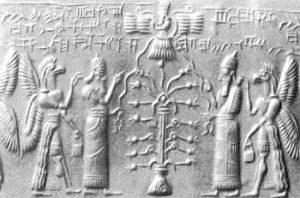 (Enki, Anu in his sky-disc above, Enlil, & their winged pilots on each end)
(Enki, Anu in his sky-disc above, Enlil, & their winged pilots on each end)
Summer, the heroic son of Enlil, was convinced of his own strong power
and consequently trusted in himself.
He acted as if in a friendly manner to the insults that Winter had spoken to him.
264-273 Then Summer replied to Winter:
“Winter, you should not boast about your superior strength
after you have explained the grounds for your boasting.
I shall speak about your abode in the city which I shall …….
You seem like a man of office but you are an inept one.
Your straw bundles are for the oven-side, hearth and kiln.
Like a herdsman or shepherd encumbered by sheep and lambs,
helpless people run like sheep from oven-side to kiln, and from kiln to oven-side, in the face of you (?).
In sunshine …… you reach decisions, but now in the city people’s teeth chatter because of you.
274-282 “When the day is half done, nobody walks about in the streets.
The servant, basking by the side of the oven, is in the house until sunset.
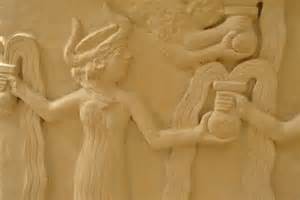 (Anunnaki daughter to Enki, goddess Ninsikila helping out on Earth Colony)
(Anunnaki daughter to Enki, goddess Ninsikila helping out on Earth Colony)
The maid, not attending to the flow of the water-container, passes the day on garments.
As for the fields not worked in winter, their furrows are not cut straight and their grain,
having not been cast into a wholesome place, is taken away by huge flocks of rooks.
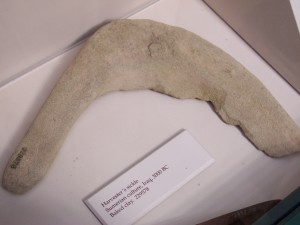 (3,000 B.C. clay sickle of Sumer)
(3,000 B.C. clay sickle of Sumer)
The vegetable cutter …… does not …… those vegetables at the market.
Carrying old reeds, the laborer is halt and lame.
Don’t speak with a gaping mouth of your superior strength — I will make known its shape and essence.”
283-287 For a second time Summer had taunted Winter.
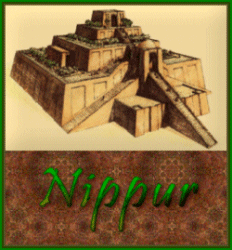
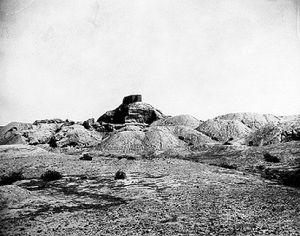 (Enlil‘s Earth Colony Command Central)
(Enlil‘s Earth Colony Command Central)
On that day of the E-kur’s (Enlil‘s temple – residence) festival and Sumer’s plenty,
the two of them stretched (?) their legs and stood combatively.
Summer and Winter, like great bulls about to tear at each others horns,
bent forward like wild bulls in the main courtyard and took up their positions.
288-296 Like a great bull Winter raised his head to speak:
“Father Enlil, you gave me control of irrigation; you brought plentiful water.
I made one meadow adjacent to another and I heaped high the granaries.
The grain became thick in the furrows.
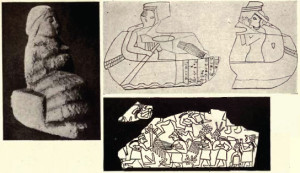 (Ninlil shared equal authority with spouse Enlil on Earth Colony)
(Ninlil shared equal authority with spouse Enlil on Earth Colony)
Ezina (Ninlil, Grain Goddess, Nisaba‘s daughter) came forth in splendor like a beautiful maiden.
Summer, a bragging field-administrator who does not know the extent of the field,
…… my thighs grown tired from toil.
…… tribute has been produced for the king’s palace.
Winter admires the heart of your …… in words.”
297-303 Summer pondered everything in his head and calmed down.
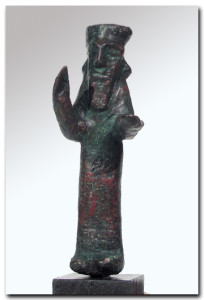 (Enlil, Anu‘s son & heir, father to Ninurta & Adad)
(Enlil, Anu‘s son & heir, father to Ninurta & Adad)
Summer spoke respectfully to Enlil:
“Enlil, your verdict is highly valued, your holy word is an exalted word.
The verdict you pronounce is one which cannot be altered — who can change it?
There was quarreling of brother with brother but now there is harmony.
For as long as you are occupying the palace, the people will express awe.
When it is your season, far be it from me to humiliate you — in fact I shall praise you.”
304-309 Enlil answered Summer and Winter:
“Winter is controller of the life-giving waters of all the lands – the farmer of the gods produces everything.
Summer, my son, how can you compare yourself to your brother Winter?”
The import of the exalted word Enlil speaks is artfully wrought,
the verdict he pronounces is one which cannot be altered — who can change it?
310-315 Summer bowed to Winter and offered him a prayer.
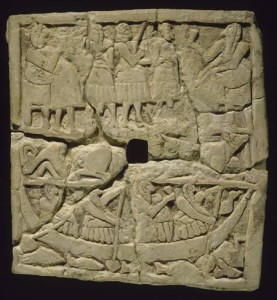 (Anunnaki giant gods drinking on land & sea)
(Anunnaki giant gods drinking on land & sea)
In his house he prepared emmer-beer and wine.
At its side they spend the day at a succulent banquet.
Summer presents Winter with gold, silver and lapis lazuli.
They pour out brotherhood and friendship like best oil.
By bringing sweet words to the quarrel (?) they have achieved harmony with each other.
316-318 In the dispute between Summer and Winter,
Winter, the faithful farmer of Enlil (NInurta), was superior to Summer —
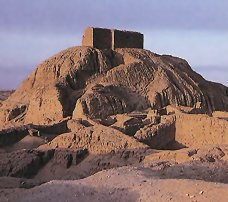 (Enlil‘s great mountain / residence / Command Post in Nippur)
(Enlil‘s great mountain / residence / Command Post in Nippur)
praise be to the Great Mountain, father Enlil!




 (1st settlements established by
(1st settlements established by 






































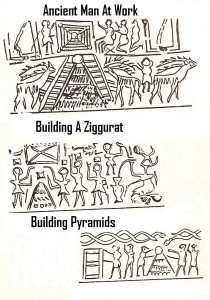
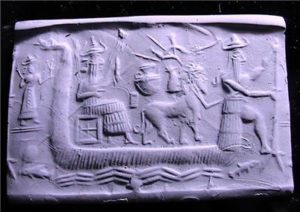
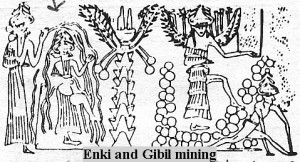
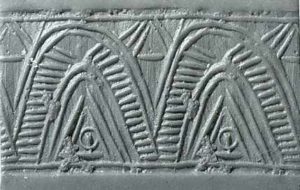
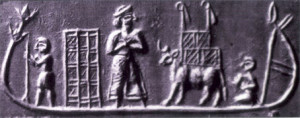
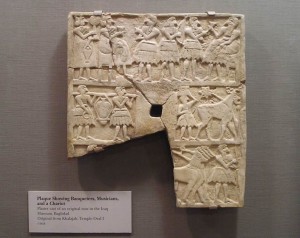
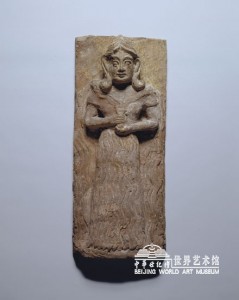
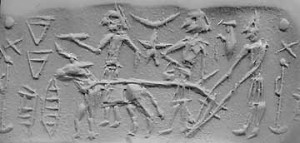
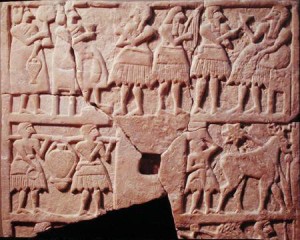
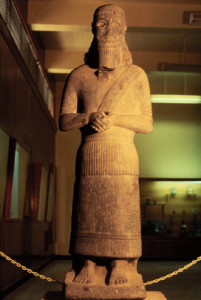
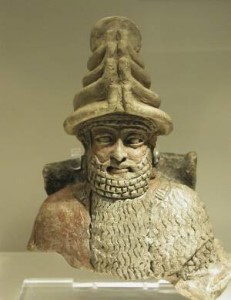
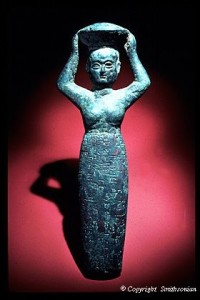
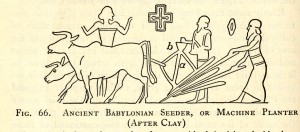
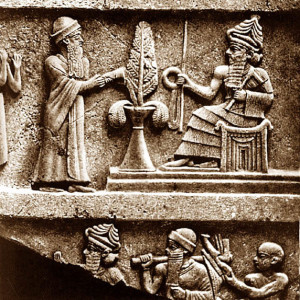
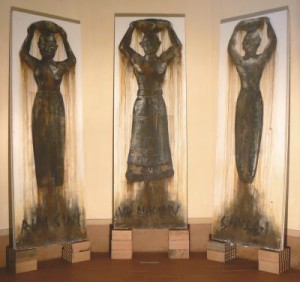
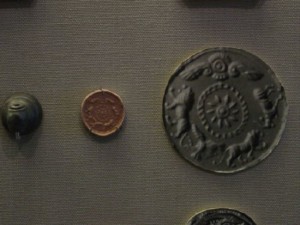
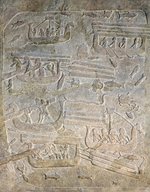
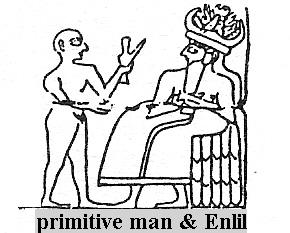
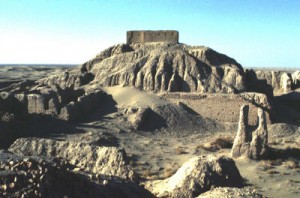
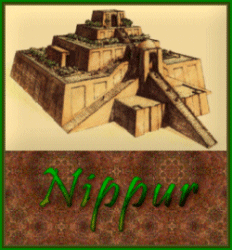
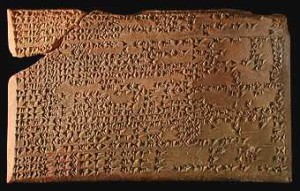
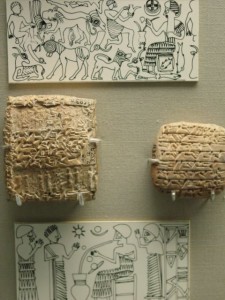
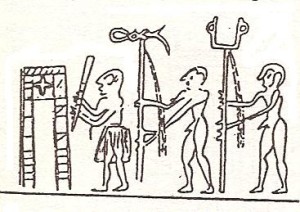
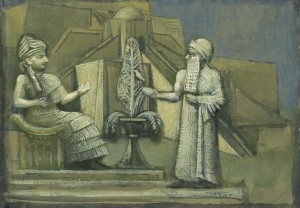

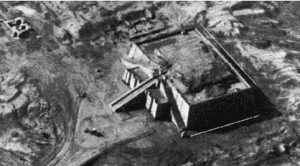
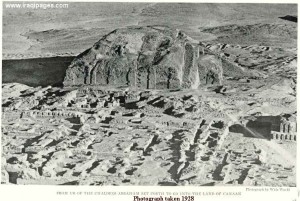
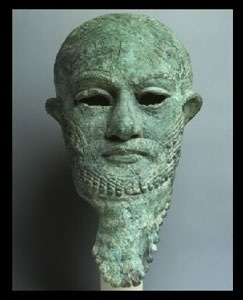
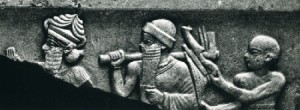
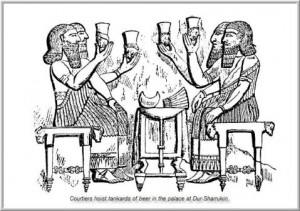
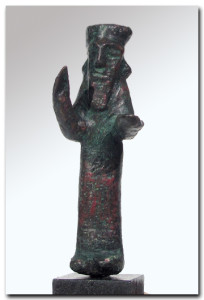
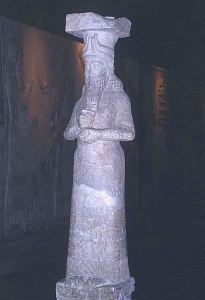
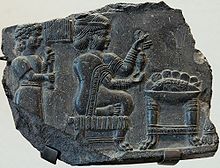
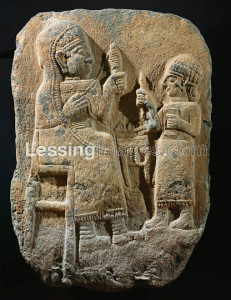
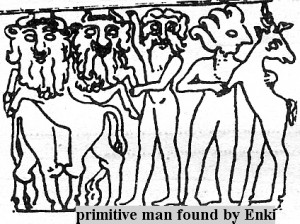
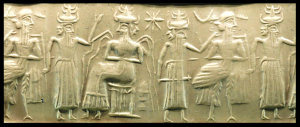
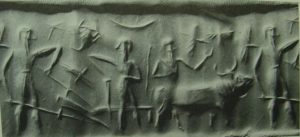 (early farming on Earth Colony)
(early farming on Earth Colony)